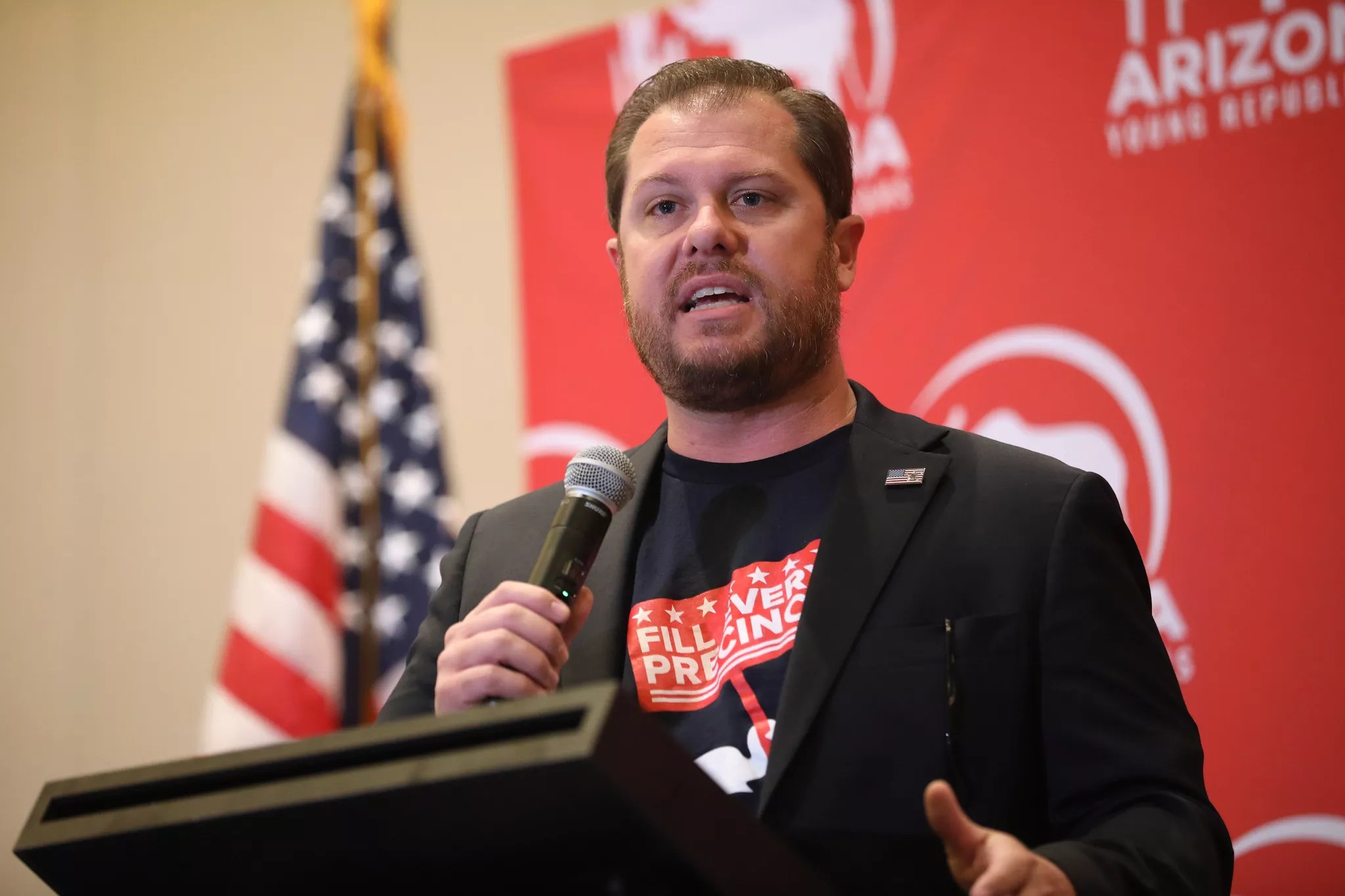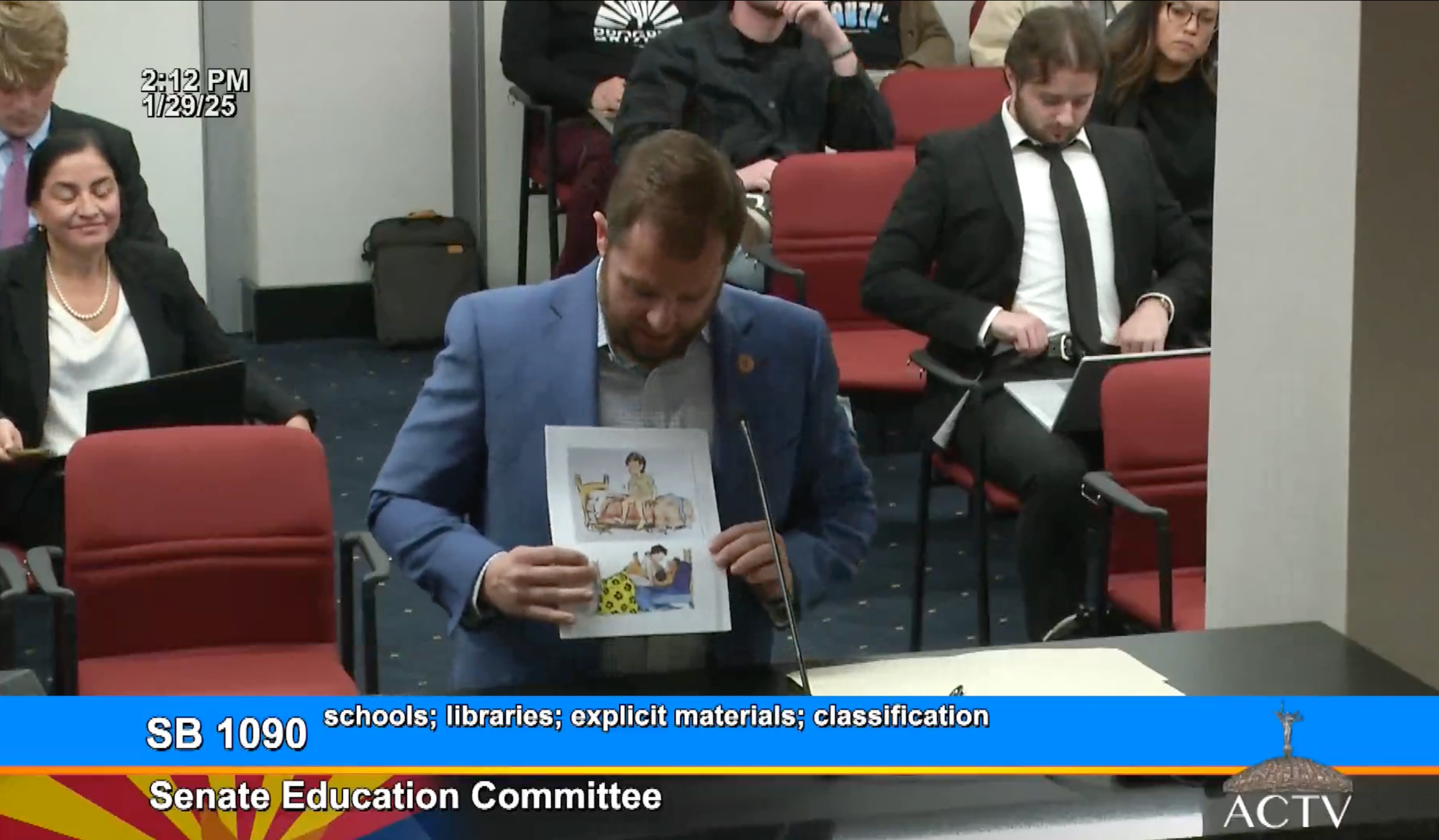
Gage Skidmore/Flickr/CC BY-SA 2.0

Audio By Carbonatix
In Kristin Roberts’ English classroom, the library has two sections. One is larger than the other.
The smaller of the two contains books that students may take and read as they please. The second section is bigger and, figuratively, guarded. The books there, such as the young adult novel “The Perks of Being a Wallflower,” are not particularly controversial. But in order for students to read them – or even flip through a few pages – Roberts must first get a parent’s permission.
This restriction is the result of a 2022 law, passed by Republicans and signed by former Gov. Doug Ducey, that requires parental consent in order for teachers to provide students with “sexually explicit materials.” That’s been headache enough for educators such as Roberts, an 18-year teaching veteran who works in a Phoenix-area high school. (She asked to withhold the name of her school to make it clear she was speaking in an individual capacity.) And now, if a student slips a peek at a book without Roberts jumping through the proper hoops, a far-right Republican lawmaker would like to toss her in prison.
Senate Bill 1090 is being pushed by Freedom Caucus member Sen. Jake Hoffman of Queen Creek. Currently, Arizona law prescribes no penalty for violating the “sexually explicit materials” statute. Hoffman’s bill, which also applies to employees of public libraries but not to those of private schools, would make a violation a class 5 felony, punishable by between six months to 2.5 years imprisonment.
“Are teachers going to be given a felony if we teach Romeo and Juliet?” Roberts asked.
At a Senate Education Committee hearing on Tuesday, Hoffman claimed the bill and its criminal penalties are necessary because “liberally controlled school districts” aren’t following the 2022 law, which he also sponsored. Hoffman did not mention any specific schools or districts where this is happening, nor did he respond to a request for comment from Phoenix New Times.
Hoffman showed the Republican-controlled committee images from “It’s Perfectly Normal,” a frequently banned sex education book by Robie H. Harris. Following the lead of Gilbert-based anti-LGBTQ hate group Family Watch International, GOP lawmakers have for years used the book to whip up moral panic and push claims of sexually explicit materials in schools.
Published in 1994, “It’s Perfectly Normal” is an illustrated health manual meant to help parents broach the uncomfortable sex education talk with kids entering puberty. Showing illustrations from from the book to the committee, Hoffman called it “one of dozens and dozens of books that exist on the shelves of our library systems and in our school systems today.” However, there’s little evidence that Arizona educators use the book in their curricula.
What is used in classrooms – but requires parental consent to teach – is a wide swath of material. Tuesday’s hearing included testimony from Rosie Stewart, the senior public policy manager for Penguin Random House Publishers, who pointed out works that could be barred by the bill’s “excessively expansive” definition of “sexually explicit.”
Stewart told the committee, “This bill would bar classics such as “Beloved” by Toni Morrison, “The Diary of Anne Frank,” “1984” by George Orwell, just to name a few.”
SB 1090 passed through the Senate Education Committee by a 4-3 party-line vote. It’ll be dead on arrival if ever gets to Gov. Katie Hobbs – Hobbs vetoed a similar measure last year – though Republicans and Hoffman could still seek to put it before voters as a ballot measure. Even if the bill advances no further, though, educators and advocates say it and similar measures are having a chilling effect.
And one educator knows that all too well.

At an Arizona Senate Education Committee hearing on Tuesday, state Sen. Jake Hoffman showed pages of the sex education book “It’s Perfectly Normal”.
ACTV
A chilling effect
In September, the Gilbert Police Department opened an investigation into Brittany O’Neill, an English teacher at Williams Field High School. A parent of a student in O’Neill’s college-level elective Honors Multilingual Literature class didn’t like a book that was part of the lessons. The parent filed a police report.
A month prior, O’Neill spoke to the Higley Unified School District School Board about the situation. She explained that a parent had a problem with the books on O’Neill’s curriculum and accused her “of disseminating child pornography and being a groomer” and “attempted to have the police open an investigation against me” based on the “approved literature being offered.”
The book in question, “Homegoing” by Yaa Gyasi, is a historical fiction novel and international bestseller that follows the “parallel paths of these sisters and their descendants through eight generations.” In early November, Gilbert police closed the case due to insufficient probable cause, and Arizona State Board of Education Deputy Director Bruce Duplanty said O’Neill “has not gone to the Board for any reason to date.”
O’Neill could not be reached for comment, but other teachers have taken note. Roberts said that she’s seen teachers stop teaching lessons related to Martin Luther King Jr. Day for fear of being accused of teaching “critical race theory.”
“They were afraid that someone was going to raise up a concern and try to take away their certificate or create a show at the school board meeting,” Roberts said.
Even without criminal penalties, the law as written has created issues for educators. Since the 2022 statute went into effect, teachers and school districts have sent lists of books home with students so they could get their parent’s permission to read them. If the books are considered even close to “sexually explicit,” some teachers send home individual permission slips for that specific book.
Now teachers such as Roberts sacrifice instructional time to “manage and monitor these permission slips.” That “kills the momentum that we were building with learning how to select books and learning to read for pleasure,” she said.
“No teachers in Arizona are truly teaching sexually explicit materials,” said Tyler Kowch, a spokesperson for the public education advocacy organization Save Our Schools. “That just doesn’t happen in public schools. We should be able to trust these highly qualified educators to make these determinations. We shouldn’t have this nanny police state over what books are being read.”
But a nanny police state is what teachers see Arizona schools becoming, leading many to leave the profession. Arizona is already low on teachers, and the state’s students are already bad at reading. According to the 2024 Nation’s Report Card, only 25% of Arizona’s 8th graders are proficient in reading, which is five points below the national average and has only worsened post-pandemic.
Reading is supposed to be an exploratory experience, opening up new worlds for students and exposing them to new ideas. Instead, in service of “parental choice,” Republican lawmakers want to throw up barriers and, if they had the votes, throw teachers behind bars.
What effect would that have on learning? Teachers would rather not find out.